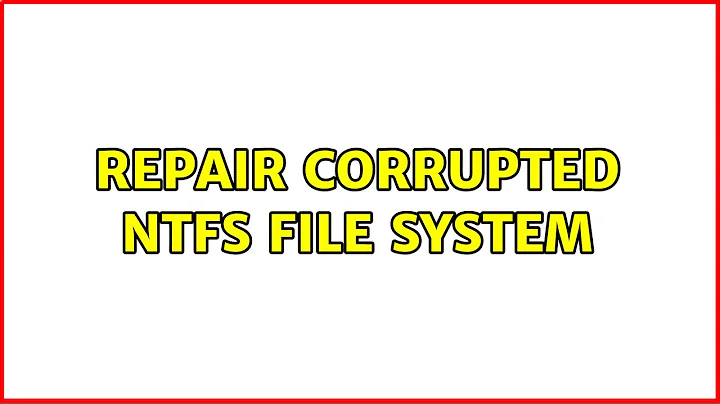How to fix corrupted NTFS
I found a great opensource tool called testdisk & followed this tutorial AND YES It put a fresh spirit upon the HDD
Related videos on Youtube
Mirkan
Updated on September 18, 2022Comments
-
Mirkan over 1 year
I was trying to backup my linux box (ext4) into an external NTFS HDD using rsync I got some failure errors and then I deleted the backup on External HDD using "rm -r" & "rm -rf" which was not able to delete all files/DIRs and there was some weird sounds coming out of HDD after this process (even if it was not mounted {Yes, I could still mount it} ) this happend couple of times (re-backup and delete again) then I pluged the device into an MS-Windows and tried "chkdsk /f" which fixed the sound issue and created some folders/files named "found.000 to found.999" (I was not able to see them on windows even with the hidden option enabled) it was somehow a recovey of what I had tried to get rid of with rm -rf and at the end I decided to remove all found.000-999 folders using on linux with rm -rf.
Now neither on windows nor on linux Im not able to mount it, I can see the device using diskmgmt.msc on windows and using lsblk/fdisk on linux before the disaster it was an one partition HDD now its divided to 4-5!
However Its VERY IMPORTANT/VITAL to save the data
Here is some output
# fdisk -l /dev/sdc Disk /dev/sdc: 1.8 TiB, 2000365289472 bytes, 3906963456 sectors Units: sectors of 1 * 512 = 512 bytes Sector size (logical/physical): 512 bytes / 512 bytes I/O size (minimum/optimal): 512 bytes / 512 bytes Disklabel type: dos Disk identifier: 0x6e697373 Device Boot Start End Sectors Size Id Type /dev/sdc1 ? 1936269394 3772285809 1836016416 875.5G 4f QNX4.x 3rd part /dev/sdc2 ? 1917848077 2462285169 544437093 259.6G 73 unknown /dev/sdc3 ? 1818575915 2362751050 544175136 259.5G 2b unknown /dev/sdc4 ? 2844524554 2844579527 54974 26.9M 61 SpeedStor Partition table entries are not in disk order.,
# ntfsfix -d /dev/sdc Mounting volume... ntfs_mst_post_read_fixup_warn: magic: 0x00000000 size: 1024 usa_ofs: 0 usa_count: 65535: Invalid argument Record 0 has no FILE magic (0x0) Failed to load $MFT: Input/output error FAILED Attempting to correct errors... ntfs_mst_post_read_fixup_warn: magic: 0x00000000 size: 1024 usa_ofs: 0 usa_count: 65535: Invalid argument Record 0 has no FILE magic (0x0) Failed to load $MFT: Input/output error FAILED Failed to startup volume: Input/output error Checking for self-located MFT segment... ntfs_mst_post_read_fixup_warn: magic: 0x00000000 size: 1024 usa_ofs: 0 usa_count: 65535: Invalid argument OK ntfs_mst_post_read_fixup_warn: magic: 0x00000000 size: 1024 usa_ofs: 0 usa_count: 65535: Invalid argument Record 0 has no FILE magic (0x0) Failed to load $MFT: Input/output error Volume is corrupt. You should run chkdsk.THANKS
-
 Tetsujin almost 9 yearsLooks like the drive died. Time to trash it & recover from backup. 'Weird sounds' is never a good sign.
Tetsujin almost 9 yearsLooks like the drive died. Time to trash it & recover from backup. 'Weird sounds' is never a good sign.
-
-
 user almost 9 yearsHi Mirkan. It's good that you were able to recover your data, but we try to make answers here self-contained. Links are great for additional information but should not be required to understand what the answer is talking about; the linked page may be changed, or removed entirely. Can you incorporate the relevant information from the linked page, such that this answer will still be useful if the linked pages change?
user almost 9 yearsHi Mirkan. It's good that you were able to recover your data, but we try to make answers here self-contained. Links are great for additional information but should not be required to understand what the answer is talking about; the linked page may be changed, or removed entirely. Can you incorporate the relevant information from the linked page, such that this answer will still be useful if the linked pages change? -
 user almost 9 yearsAlso, I agree with what Tetsujin wrote in a comment on the question; "weird sounds" coming from a hard drive is never a good thing. I would very strongly encourage you to (1) replace that HDD with a new one, while it is working and you are able to get your data off it, and (2) get proper backups in place so you don't have to go through something similar again the next time a drive fails for you.
user almost 9 yearsAlso, I agree with what Tetsujin wrote in a comment on the question; "weird sounds" coming from a hard drive is never a good thing. I would very strongly encourage you to (1) replace that HDD with a new one, while it is working and you are able to get your data off it, and (2) get proper backups in place so you don't have to go through something similar again the next time a drive fails for you.

![[Solved] The file or directory is corrupted and unreadable | Hard Drive is not accessible...](https://i.ytimg.com/vi/63XPjAzsnCk/hq720.jpg?sqp=-oaymwEcCNAFEJQDSFXyq4qpAw4IARUAAIhCGAFwAcABBg==&rs=AOn4CLB0Uznmuh5AuPjQsPGfd38VtiJnMw)




![NTFS.sys Failed Blue Screen Error on Windows 10 FIX [2022]](https://i.ytimg.com/vi/WMi6h_3l500/hq720.jpg?sqp=-oaymwEcCNAFEJQDSFXyq4qpAw4IARUAAIhCGAFwAcABBg==&rs=AOn4CLDzR35rHOtJWurZwCXC6BZ8YG3Qkw)